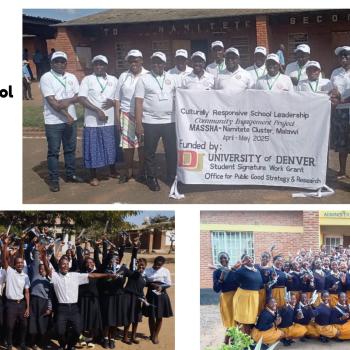Culturally Responsive School Leadership for Improving Learning Outcomes for the Rural Students at MASSHA - Namitete Cluster, Malawi
By Tiyanjane Dzilankhulani
My name is Tiya Dzilankhulani, and I am a Ph.D. student in Educational Leadership and Policy Studies at the University of Denver. As a Malawian woman and educator, this project gave me the opportunity to return virtually to a rural community that helped shape me as a transformative leader.
With support from the Center for Community Engagement to advance Scholarship and Learning (CCESL) and under the guidance of our professor, Dr. Kristina Hesbol, I led a two-phase community engagement project that was both deeply personal and professionally enriching. The project combined a knowledge-sharing workshop and material support for students preparing for national exams.
I co-facilitated a virtual workshop with Lydia Maseko, focusing on Culturally Responsive School Leadership (CRSL). We conducted a participatory session with 14 secondary school headteachers from the Malawi Secondary School Headteachers Association (MASSHA) - Namitete Cluster in Lilongwe Rural, Malawi. We sought to co-create leadership solutions rooted in CRSL to address persistent achievement gaps, especially in national examinations. Although MASSHA – Namitete is a public entity, it collaborates with public, private, and faith-based schools and I am proud to say that I served as a leader of one of the faith-based schools in this cluster.
For many participants, the CRSL framework was new, yet they soon realized they were already practicing many of its core values. Through tools like root cause analysis and power mapping, school leaders identified systemic and cultural challenges and reimagined their roles in partnering with communities. By the end of the workshop, they had co-developed culturally grounded solutions and crafted a shared vision for their cluster, committed to inclusive leadership built on empathy, humility, and care.
In the second phase, we extended this vision into action by distributing pens, rulers, and mathematical instruments to 100 MSCE candidates preparing for the Malawi National Examinations Board (MANEB) exams. This was more than a material donation, it was a tangible gesture of trust-building and power-sharing, symbolizing solidarity between school leadership and learners.
What made this experience profoundly meaningful was my personal connection with the community. I have walked their path, shared in their experiences of persistence dropout and low academic performance, and once stood beside them in search of change. This project allowed me to return not to impose external solutions, but to co- create, to listen, and to honor the people and place that shaped me as one of the school leaders in the area.
This journey affirmed that transformative leadership begins with humility, listening, and relational trust. This journey reminded me that academic leadership is not just about knowledge it is about purposeful engagement, rooted in grace, reflection, and shared hope to promote access to quality education for our children, in alignment with Malawi Agenda 2063, the nation’s long-term vision for sustainable development.
